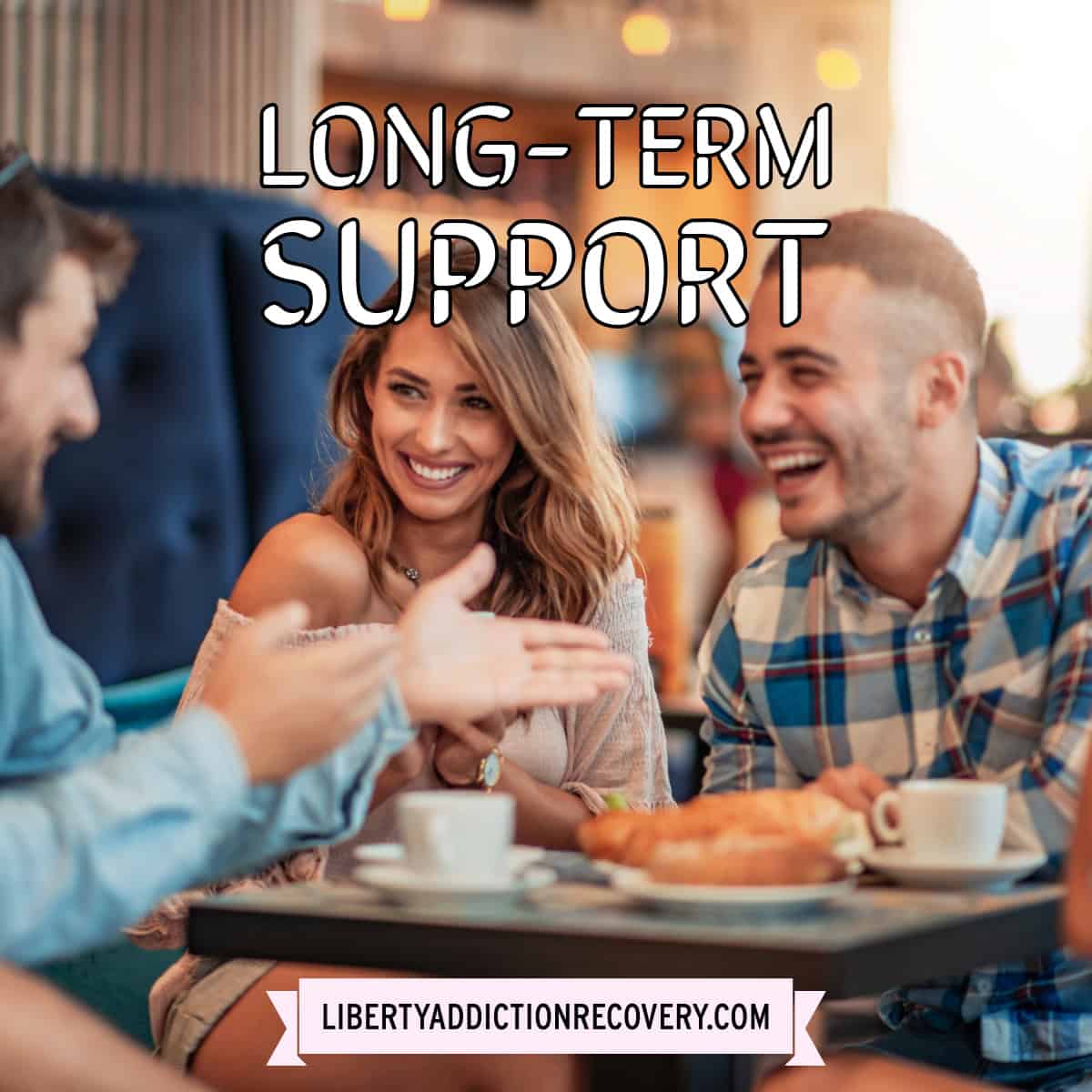Addiction recovery is a challenging journey that requires more than just personal willpower. It demands a robust support system to guide and uplift individuals as they navigate the complexities of overcoming addiction. One of the most vital components to long-term sobriety are support groups in addiction.
Support groups are crucial in providing emotional, psychological, and social assistance to individuals in recovery. They offer a safe haven where members can share their experiences, learn from others, and find the strength to continue their recovery journey. At Liberty Addiction Recovery Centers, we have seen firsthand the transformative power of support groups in helping individuals achieve long-lasting sobriety.
In this article, we will explore ten reasons why Support Groups in Addiction matter, shedding light on their significant benefits to those seeking a healthier, addiction-free life.
1. Sense of Community
Feeling of Belonging
Addiction often leads to feelings of isolation and loneliness. Support groups counteract this by creating a sense of community where individuals feel they belong. This sense of belonging is essential as it provides a network of people who understand the struggles and triumphs of addiction recovery.
Real-Life Example
Consider Jane, who felt isolated during her battle with addiction. Upon joining a support group, she found a community of people who genuinely understood her struggles. This newfound sense of belonging helped her stay committed to her recovery journey. Jane’s story is a testament to the power of community in support groups, illustrating how they can turn feelings of isolation into connectedness.

2. Shared Experiences
Empathy and Understanding
One of the most profound benefits of Support Groups in Addiction is sharing experiences with others who have faced similar challenges. This sharing fosters empathy and understanding, making members feel less alone. When individuals talk about their journeys, they often find solace in knowing that others have walked similar paths and have overcome similar obstacles.
Group Activities
Support groups often engage in interactive group activities that enhance the shared experience. Group discussions, role-playing, and collaborative problem-solving exercises help members connect more deeply. These interactions build a strong foundation of empathy and mutual support, crucial for sustained recovery.
3. Accountability
Staying on Track
Accountability is a critical element in maintaining sobriety. Support groups help individuals stay on track by providing a structured environment where members are encouraged to set and achieve recovery goals. Knowing that others are keeping track of their progress can motivate individuals to remain committed to their recovery plans.
Regular Meetings
Regular meetings are an integral part of the accountability process. These meetings provide consistent check-ins where members can discuss their progress, setbacks, and plans. This routine helps maintain sobriety and builds a sense of responsibility towards oneself and the group. The consistency of these meetings can be a powerful tool in relapse prevention strategies.

4. Emotional Support
Safe Space
Support Groups in Addiction offer a safe space where individuals can express their emotions without fear of judgment. This emotional safety net is crucial for those in recovery, as it allows them to confront and process their feelings openly. Whether it’s frustration, sadness, or joy, sharing these emotions in a supportive environment can be incredibly healing.
Personal Stories
Take the story of Mike, who struggled to open up about his feelings during his time in addiction rehab. He found a welcoming environment in his support group that encouraged him to share his story. This openness allowed Mike to confront his emotions head-on, significantly aiding his recovery. His journey highlights the importance of emotional support in the healing process.
5. Learning from Others
Diverse Perspectives
Support Groups in Addiction bring together individuals from various backgrounds and stages of recovery. This diversity means that members can hear a wide range of perspectives and coping strategies. Learning how others have navigated their recovery can provide new insights and approaches that might not have been considered otherwise.
Peer Learning
The concept of peer learning is fundamental in support groups. Members who are further along in their recovery journey often share their experiences and advice with those just starting. This peer-to-peer guidance can be precious, offering practical tips and hope to struggling people. It creates a cycle of giving and receiving support, enriching the recovery experience for everyone involved.
6. Reducing Stigma
Breaking Down Barriers
Addiction is often accompanied by a significant amount of stigma, which can deter individuals from seeking help. Support Groups in Addiction play a crucial role in reducing this stigma by providing a judgment-free environment. In these groups, addiction is understood as a disease rather than a moral failing, which helps in breaking down the barriers of shame and guilt.
Community Outreach
Many Support Groups in Addiction engage in community outreach efforts to educate the public about addiction and recovery. These efforts help to further reduce stigma by spreading awareness and fostering a more compassionate understanding of addiction. By changing public perceptions, support groups contribute to a more supportive environment for individuals in recovery. Check out our article, Common Myths About Addiction.

7. Encouragement and Motivation
Positive Reinforcement
Encouragement and positive reinforcement are potent tools in the recovery process. Support groups are often filled with uplifting and motivating individuals who continuously encourage their peers. This positive reinforcement helps members stay motivated and focused on their recovery goals.
8. Building Healthy Relationships
Trust and Friendship
Support Groups in Addiction provide an excellent opportunity to build healthy relationships based on trust and mutual respect. These relationships can be incredibly therapeutic, offering emotional and social support. Trust and friendship developed in these groups can last a lifetime, providing a reliable network of support even outside the group meetings.
Family Involvement
Many support groups also encourage family involvement through family therapy sessions. These sessions help to rebuild strained relationships and foster a supportive home environment. When family members are educated about addiction and involved in the recovery process, it strengthens the individual’s support system and enhances the overall recovery experience.

9. Coping Strategies
Practical Advice
Support groups are a treasure trove of practical advice and coping strategies. Members share techniques that have helped them manage cravings, stress, and other challenges associated with recovery. This practical advice can be immediately applied, making the recovery journey smoother and more manageable.
Workshops and Seminars
Many Support Groups in Addiction organize workshops and seminars focused on developing coping strategies. These educational sessions provide members with tools and techniques to handle various aspects of their recovery. From stress management workshops to seminars on healthy living, these events equip individuals with the knowledge they need to maintain their sobriety.
10. Long-Term Support
Lifelong Connections
One of the most significant benefits of support groups is the potential for lifelong connections. These groups provide ongoing support long after formal treatment has ended. The friendships and bonds formed in these groups often continue to provide emotional and social support for years to come, creating a lasting network that individuals can rely on throughout their lives.

Finding Local Support Groups in Addiction
Community Support
Chances are, there are local support groups available in your area. Various 12-step meetings, such as Alcoholics Anonymous (AA) and Narcotics Anonymous (NA), offer a robust community of support. These meetings are held regularly and are open to anyone seeking help with addiction. The 12-step approach has been a cornerstone of recovery for many, providing a structured path and a supportive network.
Alumni Programs
Most rehab centers, including Liberty Addiction Recovery Centers, offer Alumni programs beyond traditional group meetings. These programs often include activities, workshops, and events run by alumni, creating a vibrant community that continues to support each other long after formal treatment has ended. Alumni programs provide an ongoing connection to the recovery community, offering a wealth of resources and support to help maintain sobriety.
Find a Support Group
If you’re looking for a support group, explore local options. Many community centers, churches, and hospitals host meetings. Additionally, your rehab center can provide information about their Alumni programs and other resources. The key is to find a group where you feel comfortable and supported, as this will significantly enhance your recovery journey.
Conclusion
Support groups in addiction are a cornerstone of successful addiction recovery. They provide community, shared experiences, accountability, emotional support, and more. By participating in a support group, individuals can find the encouragement, understanding, and practical advice they need to navigate their recovery journey. At Liberty Addiction Recovery Centers, we understand the transformative power of support groups and are committed to providing comprehensive support to help individuals achieve lasting sobriety.
Call Us, We Are Here To Help!
If you or a loved one are struggling with addiction, consider exploring the support group options at Liberty Addiction Recovery Centers. Our dedicated team is here to help you find the right group and provide the support you need. Visit our website to learn more about our rehab centers in Utah, and start your journey toward recovery today. For more information, contact us.






